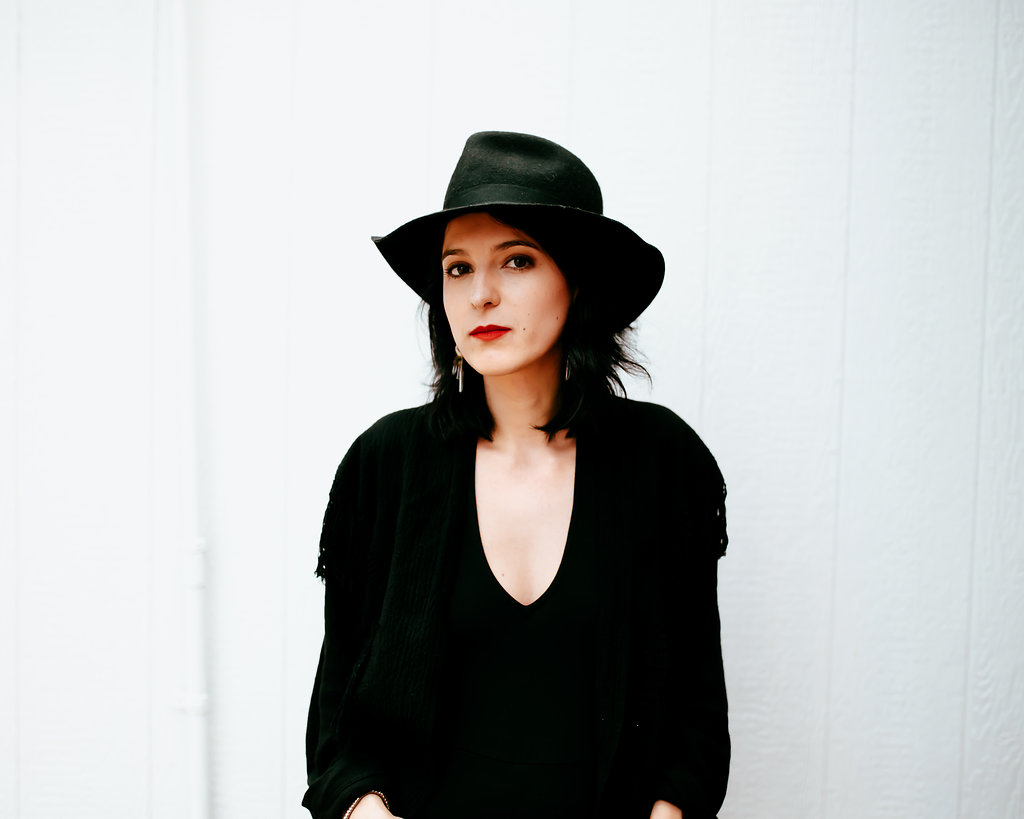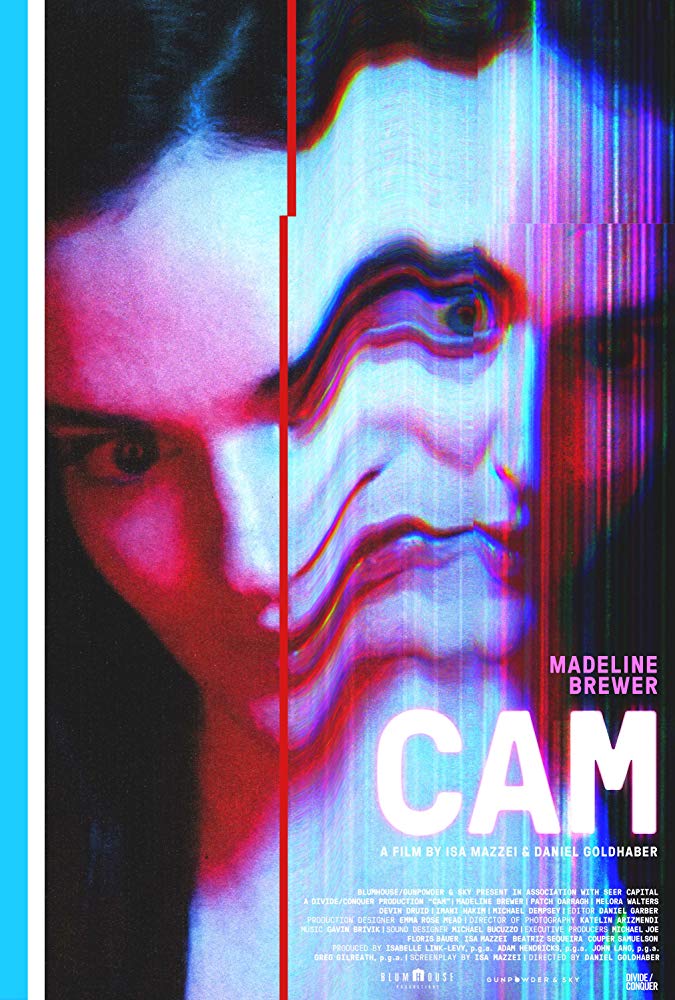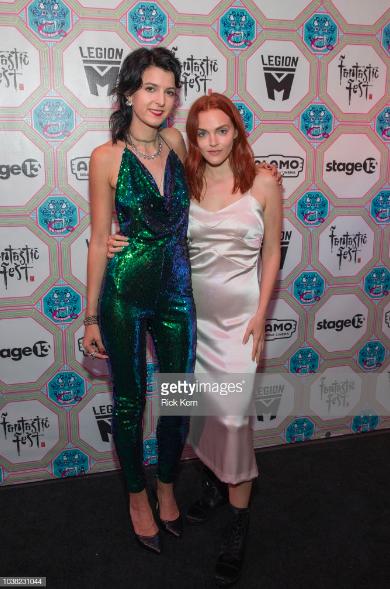

I remember when the Supreme Court of Canada was arguing applications of laws around sex work. I was a young law student, and it was a hot topic in our classrooms. I remember the decision to remove certain restrictions, and the dissenting opinion of a judge that we would regret this. I agreed. “We are commodifying women!” I thought. “We don’t allow the sale of body parts, so why this?” I thought. I was wrong. Over time, I learned how sex workers were harmed by these laws and stigmas. And the sleeper hit, Cam, taught me more about the vulnerability, work, and humanity of sex workers more than any discussion I had in that law school classroom.
Barriers to women exist in almost every industry. Late last year, we discussed women in horror, and where the female horror filmmakers were. Isa Mazzei, writer of this year’s Fantasia Fest darling, Cam, didn’t just remind us how many incredible women there are making horror films, and how many more there are waiting in the wings. She also created a film full of scares that also painted a new picture of sex workers. It called attention to their specific issues, forcing the audience to tune into a sex worker’s humanity, and for probably one of the first times on film, be on her side.
That’s why it felt imperative that for Women in Horror Month, I speak to this trailblazer.
Nightmarish Conjurings: As you know, Women in Horror Month is coming up and when we talked about who we wanted to speak to, I was very excited at the idea of speaking to you, so thank you. So, to start off, tell me a bit about your intro to horror. How did you end up being a horror film writer?
Isa Mazzei: I’ve always loved horror. It’s kind of like my favorite genre. I’ve grown up watching horror movies and loving it. So it felt kind of really natural for me to write horror movies. I also really like Sci-Fi and studied futurism and weirder avant-garde literature in college. So it all just kind of came together. For me, horror is such a powerful way to tell subversive and fresh stories because it is so commercial and enthralling and really fun to get audiences wrapped up in that.
Nightmarish Conjurings: Tell me about your trajectory. You went to Berkley, correct?
IM: Ya, I went to UC Berkley. I studied comparative literature there.
Nightmarish Conjurings: Have you always been interested in writing?
IM: Ya, I mean I have been writing my whole life. Basically, as long as I could read, I have wanted to be a writer. I used to write really terrible novels in my adolescence.

Nightmarish Conjurings: Let’s talk about your movie. It’s obviously a hit and I loved it. Talk to me a bit about what you wanted the audience to get out of this movie. When you put the pen to paper, what did you want the audience to see?
IM: I think first and foremost, I wanted the audience to empathize with a sex worker. I wanted them to root for Alice and I wanted them to have a fun time doing it. The impetus for the film was to represent a different type of sex worker that I hadn’t seen represented that often before and I felt like it was an important story to tell.
Nightmarish Conjurings: I know you’ve mentioned this elsewhere, you had certain rules you wanted to follow. Can you tell me a bit about that?
IM: Danny (Goldhaber), the director, and I made a manifesto before we even started the process of making the film which outlined our vision and what was really important for us to do. When you take a movie out to sell it, you get a lot of notes back and a lot of feedback and it can get a little overwhelming at a point to decide what’s right and what’s wrong. We had this document to refer back to that which outlined the things we wouldn’t negotiate on and then everything else was up for discussion. I don’t actually know what all of the rules were but, they were pretty straight forward. We didn’t want the main character to be judged or shamed for her choices or her choice to engage in sex work. We didn’t want to derive the negative stakes of the film from the protagonist’s decision to engage in sex work. I really wanted to develop fleshed out characters for her cam guys, so I spent almost a month scripting 98 pages of chats for the chat room to give each guy his own personality, his own grammatical style, his own story. So there were just a few rules like that. Then also, another one was, in the end, we always knew she needed to go back and that was another thing that was non-negotiable for us.
Nightmarish Conjurings: Were there certain people that helped you realize your vision to make sure it was the way you wanted it to be?
IM: Ya absolutely. The first person who got on board was Isabelle Link-Levy, our creative producer, who went to school with Danny. We sent her the script just for notes and she was like, “I’m producing this film!” and jumped on board immediately. She really held us to our vision and really helped us frame the story we were telling and made sure we were staying true to what we wanted to do with the film. And, you know, it was the three of us from the start going out to meetings. Some of the meetings were really good, and I felt really excited, and some of the meetings were really bad, and I felt really discouraged, and that’s the process of trying to sell anything in any industry really.
But it did feel kind of like it was the right moment for this story. Once we found Beatriz Sequeira at Blumhouse, she really related to the story and really understood what we were trying to do, so, she was kind of the first person in a major studio setting be like, this is good, I understand the politics of this, I understand the vision of this, and I think you guys should do this.

Nightmarish Conjurings: How involved were you ultimately on set, ensuring things were portrayed the way you wanted them to be?
IM: I was on set the whole time. I was in pre-production, I was in production, I even directed some of the scenes myself. I was very involved. That was something that we knew from the beginning because this is ultimately a film by both of us. That credit is not just for show, we really built this film from the ground up together so it was really important to us that I be on set, not just to consult the cam girl related questions, but to help bring our shared vision to life.
Nightmarish Conjurings: From my perspective, I learned so much watching your movie, which was really incredible as an audience member. Can you elaborate on what you were teaching the audience about the experience of a sex worker?
IM: I think there are many levels to that. The first thing you see in the film and the first thing I wanted to communicate was the job of sex work. I wanted to show her calendar. I wanted to show her studying. All that behind the scenes work that I think sex workers don’t get credit for and that goes unnoticed. Just as there’s a tendency in representation to kind of victimize sex workers, there’s also a tendency to glamourize them as if it’s some sort of easy job when you know, camming for me, was the hardest job I’ve ever had. I never worked harder in my life, it was constant. I wanted to show her engaging with that. With tracking her tips and talking with her users and planning her shows with Tinker and really, you know, show that side of it.
I also wanted to talk about things that I think are pretty universal like alienation from our digital selves. Lola came, for me, from a really personal place related to porn. It came from a place of having my work pirated, having my shows screen captured and put online without any attribution to me, and looking at this image of myself that was no longer linked back to me. It was really terrifying and really surreal and I wanted to communicate that, but I don’t think that’s specific to cam girls. I think that’s related to anyone that has any sort of identity online where we kind of just put this content and express ourselves into this void and wait for the validation to come back that what we posted is good. I think that’s a really interesting thing to talk about as well.
Nightmarish Conjurings: One specific scene that I found really stuck out to me was the scene with the officer. Do you want to talk about that a bit?
IM: Oh ya! Of course. The scene with the cops I think was really important to me, not only because it’s just realistic that Alice would go to the cops, but because I wanted to show a realistic response in a protagonist in a horror movie. I feel like often times in horror, in particular, we sometimes don’t let female protagonists make the smartest decisions and I think that’s problematic. It was very important for me to have her call the police in the first place because that’s something that someone would do. At the same time, I wanted to subvert that where I wanted to be honest was in the fact that the legal system is not fine for sex workers and often not received and respectful to sex workers. I think the scariest part of that cop scene is that, none of those lines, I had to write. It’s not fiction. Everything that cop says to Alice is something that has been said to me, either to sex workers I know or in articles I read. The “what’s the weirdest thing you’ve ever had to do,” line was something that was said to me by Hollywood execs when I was in meetings pitching this film.
It is a really terrifying scene but it’s also a scene drawn directly from real life and I think that it’s important for people to realize, when they see that, that this is why sex workers don’t go to the police. This is the cycle that perpetuates violence against sex workers because when they do ask for help, they’re not taken seriously, they are harassed, they are assaulted sometimes, so it’s really important to talk about that and let people know that that’s the reality that’s going on.

Nightmarish Conjurings: Ya, I think that’s what makes the scene so scary when you’re watching it, you think, “wow, that’s what would happen,” and that’s so scary.
Having had the experience last year, and knowing there was a lot of discussions the end of last year about women in horror, drawing from your own experience, what do you think would get more women making horror films?
IM: I think the thing that’s crazy is that there are a lot of women making horror films. Doing the festival circuit, there were so many incredible writers, directors, producers that I met who had films at these festivals, or shorts at these festivals, or they had scripts that they were shopping at these festivals. There are so many women right now working in the horror space and I think that it’s important to make an effort to hear their stories, to read their scripts, to go see their films, to listen to their ideas, and to really promote their work. I think it’s really easy to say “there aren’t enough women in horror,” but if we look, there’s an incredible amount of female talent in the horror industry and it’s just a matter of making sure that we promote it and that we talk about it and then we recommend it to our friends same as we do male lead projects.
Nightmarish Conjurings: I noticed a lot of Alice in Wonderland referenced throughout your movie. Can you talk to me about that?
IM: I love Alice in Wonderland. I think Danny and I both do. There’s no special, secret reason for those references. We just thought this was a Through the Looking Glass type of story where Alice wakes up and she’s in this surreal hellscape.
Nightmarish Conjurings: My last and favorite question that I ask everybody, what’s your favorite scary movie?
IM: Oh that is so hard. I am going to say my current favorite that’s not my overall favorite. But the one I am currently obsessed with is Jennifer’s Body (Starring some more Women in Horror, Megan Fox and Amanda Seyfried, and directed by Karen Kusama). I watched it recently and it’s a masterpiece. I think I didn’t appreciate it quite as much when it came out, and I rewatched recently and it just absolutely blew my mind.
Nightmarish Conjurings: Thank you so much for taking the time to chat with me! I know you’re working on a book right now, is that correct?
IM: Yes! I have a book. It comes out November 12th, 2019 from Rare Bird Books and I’m really excited about it!
Catch CAM streaming now on Netflix and be on the lookout for Isa’s book this fall!
- [Blood in the Snow Review] PUPPET KILLER - December 13, 2019
- [Toronto After Dark Review] Canadian Female Shorts - December 2, 2019
- Toronto After Dark Review: THE ODD FAMILY: ZOMBIE ON SALE - November 8, 2019

![[Interview] Sean Konrad for MONARCH: LEGACY OF MONSTERS](https://www.nightmarishconjurings.com/wp-content/uploads/2023/11/Monarch_Legacy_of_Monsters_Photo_010315-500x335.jpg)
![[Interview] Matt Shakman for MONARCH: LEGACY OF MONSTERS](https://www.nightmarishconjurings.com/wp-content/uploads/2023/11/Monarch_Legacy_of_Monsters_Photo_010314-500x335.jpg)
![[Interview] Jim Cooper, Jeff Dixon, and Leo Riley for CURSES!](https://www.nightmarishconjurings.com/wp-content/uploads/2023/11/Curses-Ep-10-Nightmarish-Conjurings-500x335.jpg)
![[Interview] Eli Roth for THANKSGIVING (2023)](https://www.nightmarishconjurings.com/wp-content/uploads/2023/11/Thanksgiving-Killer-Still-Nightmarish-Conjurings-500x335.jpg)
![[Interview] Megan Montaner for 30 COINS Season 2](https://www.nightmarishconjurings.com/wp-content/uploads/2023/11/Megan-Montaner-as-Elena-credit-Manolo-Pavon-HBO-500x335.jpg)